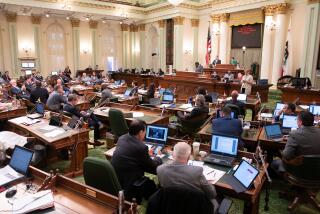Looser Version of Hatch Act Clears House
- Share via
WASHINGTON — The House voted Wednesday to liberalize a half-century-old law that restricts the political rights of federal workers, but it retained a ban on those workers’ running for federal office.
The bill, approved 333 to 86, allows the nation’s 3 million federal employees to run for some political offices, organize fund-raisers and publicly endorse candidates--as long as they do it on their own time.
But it also includes an amendment, proposed by Nancy L. Johnson (R-Conn.), that continues to bar federal employees from seeking state or federal office, except for nonpartisan state offices. Workers can run for any local office.
The bill would revise the 1939 Hatch Act, which was enacted amid revelations of political coercion within the government and concerns among lawmakers that President Franklin D. Roosevelt would use federal workers to help him get reelected.
The new legislation was supported by 247 Democrats, 85 Republicans and one independent. Voting against it were two Democrats and 84 Republicans.
The House passed similar bills twice during the George Bush Administration, only to have them vetoed. The current bill is expected to be passed by the Senate, and President Clinton has pledged to sign it.
“Federal employees might finally become full-class citizens and that’s good news for everybody,” said Rep. Patricia Schroeder (D-Colo.). She recalled her first government job, with the National Labor Relations Board. “I was horrified that I wasn’t allowed to participate in anything I considered normal civic duties,” she said.
Although half of the Republicans supported the Hatch Act revisions, some warned of employees from such agencies as the IRS using their positions to intimidate voters.
Supporters said they were merely extending free speech rights to federal workers. They said abuses would be avoided because the bill toughens penalties for misuse of authority and accepting, receiving or soliciting inappropriate political contributions.
More to Read
Get the L.A. Times Politics newsletter
Deeply reported insights into legislation, politics and policy from Sacramento, Washington and beyond. In your inbox twice per week.
You may occasionally receive promotional content from the Los Angeles Times.










